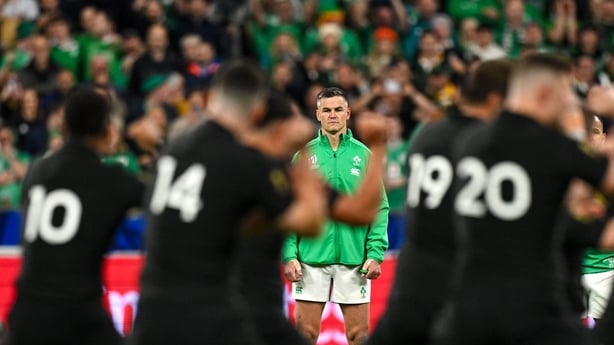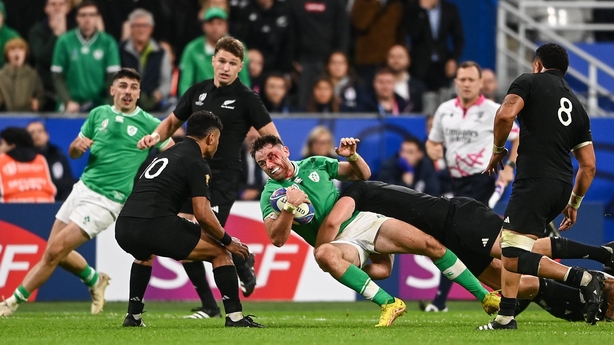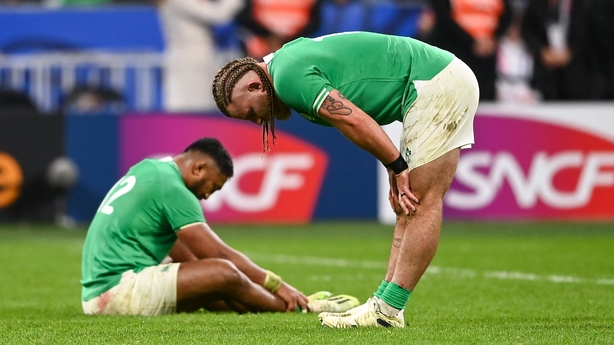Irish rugby is in mourning this week after an agonising loss in back-to-back World Cups to the All Blacks.
Unlike the loss in 2019, this one was agonisingly close, one score between the sides and a Jordie Barrett body part away from going ahead in a game that Ireland were chasing from the start.
This isn't just a loss, it’s the end of a four-year cycle, and at least two years of that cycle was spent with confident anticipation towards this World Cup because Andy Farrell had built such a strong environment for this Irish squad to flourish, building a rugby strategy and resilience that could potentially get them past the sticking point of a World Cup quarter-final, but more importantly, into the conversation of winning the tournament.
Losing is hard enough for sports people, dusting yourself off after an unsuccessful season to start a new one is also a mammoth task and uphill struggle, but I can only imagine what it must feel like to stare down the barrel of another World Cup cycle with the same tag hanging over the nation’s head.
There are certainly no easy fixes, but it’s hard to know how to even begin to change the landscape of this team with an eye on the bigger picture.
Rugby changes in every World Cup run because the laws are varied and the focus of the game changes shape as a result. Planning for the next one straight away would be silly, yet when a team loses, the temptation is to try and right some wrongs as soon as possible.

That won’t happen any time soon, Ireland won’t play another game until they travel to Marseille on the first Friday of February to take on France, another team going through the shock of exiting a World Cup when they’d have fancied their chances at winning it outright.
New Zealand came with a serious strategy to upset Ireland. It didn’t take them long to have a cut off Andrew Porter in the scrum, and were rewarded by Wayne Barnes in three scrums across the contest, in a game where scrums played a back seat role as a result of both teams’ ball retention and lack of errors.
Despite the small role the scrum played in the battle, New Zealand had their homework done and won that match-up hands down.
The Irish lineout was heavily disrupted as well, not to the same manner as the South African game, but Ireland had been given that warning and played with a lot of ball from shortened lineouts or thrown to the front to O’ Mahony and Beirne.
New Zealand disrupted three lineouts in the first half. Retallick got hands to one early on to stop the Irish attacking flow, Frizell cut out another and there was pressure on Doris for a third that made the Irish lineout miss its mark.
The lineout didn’t malfunction, but it wasn’t the front-foot set piece that Ireland have enjoyed in the past and New Zealand knew it was one way of getting themselves into the game.
Where New Zealand won the game was around the breakdown. They gave a masterclass in possession of the ball. Ireland were starved of turnovers and unstructured transition attack because New Zealand were so sharp in arriving to their own breakdown and reducing any window that Ireland might have had in getting to the ball before them.
'It's just fine margins...it's hard to come to grips with really' - Ireland's Rugby World Cup journey is over #rterugby #rwc2023 pic.twitter.com/UCIJ6KhVRX
— RTÉ Rugby (@RTErugby) October 15, 2023
On the other side of the ball, Sam Cane and Ardie Savea were in cahoots. Cane’s tackling was impressive and Ardie Savea complimented it by contesting for the ball, winning turnover penalties. It wasn’t just the clear penalties for holding on, there was an awful lot of Irish possession that was disrupted by the breakdown threat of Savea and co.
Ireland were forced to put more numbers into the ruck and to play off structures that they weren’t overly comfortable with, structures like one-out carries which were seen in the South African game as well. It took Ireland away from a shape that damages teams in some of their possession. Despite Ireland winning the possession stat, not all of this possession was comfortably in their own control.
It was also interesting to see New Zealand kicking the ball in field. They looked comfortable to keep the ball in play for longer periods and took Ireland on in the kick battle.
They went to the air often in the kick strategy and scored directly from it. It took a magical Beauden Barrett chip that was regathered, with fast recycling, and an unstructured Ireland defence to give the experienced World Cup side a 13-point lead. The New Zealand kicking strategy went a long way towards their dominance in the game.
And in saying all that, Ireland did enough to be within a Jordie Barrett miracle tackle from going ahead in the final ten minutes. Who knows if Ireland would have controlled the game from there, but going ahead for the first time with about eight minutes to play would have rocked the All Blacks.
Ireland did enough to get themselves into a position where they could win the game. However, on the balance of things, New Zealand deserved their victory for the strength of their defence, their breakdown strategy and their ability to strike an attacking blow to any opposition.
Ireland will look at the second half of the match and regret their inability to score while New Zealand were down a player.

There were two passages of play where Ireland tried to make plays and turned over the ball within one to three phases. From a maul leading to a backs strike, Gibson-Park kicked to O’Mahony on the short side. He wasn’t able to gather the ball over Richie Mounga, who was deputising for the sin-binned Aaron Smith on the end of the defensive line. There was a second attempt when Smith was back on the pitch, where Gibson-Park went for a long pass and Smith intercepted.
Other times Ireland kicked when it hasn’t been part of their identity. Hansen kicked a grubber off his right foot when running from right to left, which is a difficult skill to execute, and he was blocked. Sexton tried to chip ahead for himself which was easily gathered by New Zealand, which suggested that Ireland were running out of answers. It’s a testament to the All Blacks defence.
The talk was that the All Blacks pack wouldn’t be able for Ireland was short-sighted. Ardie Savea and Sam Cane made sure that they could compete, yet it strikes me that Ireland were a match up that New Zealand could deal with because the game is built on speed and accuracy over sheer power. Should they face South Africa in the final, those sentiments will be echoed again, and another point for these Kiwis to prove.

It was a ferocious Test match and Ireland can be proud of what they built in the last couple of years. They’ll share the disappointment with France, the hosts, who have also come up short despite believing in their ability win the tournament. The outcome is cruel, but the process has been an exciting one to follow.
A note on Johnny Sexton and Keith Earls. Both heroes of Irish rugby in their own way and highly respected both inside and outside of this group. It’s a tough way for them both to bow out when they were deserving of a more celebratory send off. When the dust settles, they can be extremely proud of all they’ve achieved.
Watch Argentina v New Zealand in the Rugby World Cup semi-finals on Friday from 7.35pm on RTÉ2 and RTÉ Player, follow a live blog on RTE.ie/Sport or the RTÉ News app





